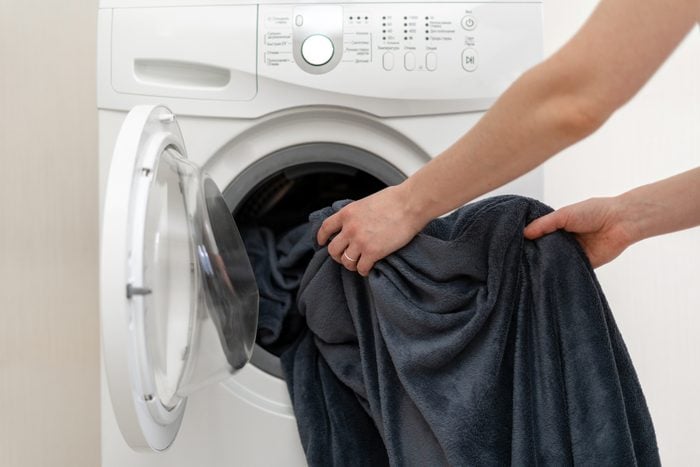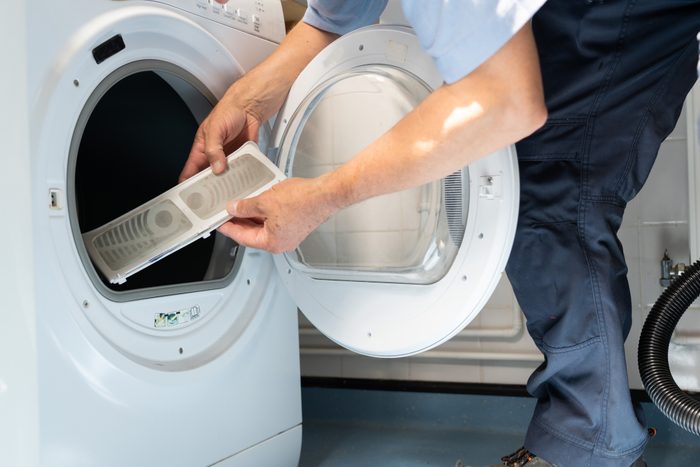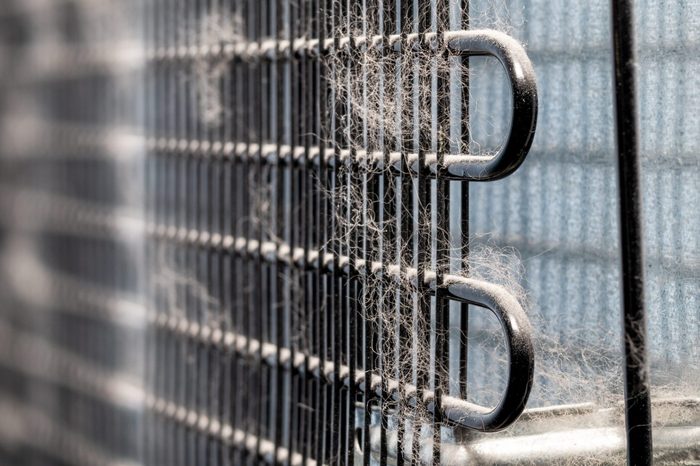Overloading the Washing Machine With Heavy Items
This is one of the most common and expensive appliance mistakes. It often results in a worn out rear bearing or a broken spider bracket. When that happens, you’ll need a new washer. It’s a $700 to $1,500 mistake.
To prevent it:
- Avoid washing bathroom mats. They absorb too much water, and the weight stresses the motor.
- Avoid washing weighted blankets. They destroy your washer faster than any other item.
- Avoid washing rugs, dog blankets, sleeping bags, comforters and all other bulky items. Like mats and weighted blankets, they’re heavy when wet and will quickly cause trouble.
Not Cleaning the Dryer Vent
This mistake can be catastrophically costly, because it can cause a dryer fire.
When dryer vents become clogged with lint, the heated air can’t escape. If the dryer gets too hot, it blows a device called the “hi-limit,” which acts like a fuse and cuts off power to the heater. Replacing it is an expensive repair.
In the worst cases, lint fills the cabinet of the dryer, where the gas flame or electric element may eventually ignite it.
Here’s how to prevent this from happening to you:
- After every load, clean the dryer’s lint filter.
- Every six months, clean out the vent with this dryer vent cleaner brush.
Using the Oven’s Self-Clean Feature
This can cause more harm than good because it may destroy part of your oven.
Self-clean temperatures can reach as high as 1,000 degrees, high enough to incinerate any dirt or grease in your oven. However, that’s also hot enough to melt your bake element, warp your heat diffuser panel, fry your oven’s electronics and a variety of other fails. I’ve been called out to fix all these things.
Instead:
- Play it safe and don’t gamble with your oven’s self clean feature. You might get lucky and have it work for you. Or you might need to call a pro to make an expensive repair.
- Try this safe manual cleaning technique. It requires some effort, but it’s much faster and safer than self-clean.
Not Rinsing Dishes Before Loading Dishwasher
The age old debate: to rinse or not to rinse. What is the answer? The answer is a little of both.
Yes, you should rinse the dishes before loading. But you don’t have to remove every speck of food. Just rinse off the big stuff. Leaving a little food on the dishes gives the detergent something to activate its enzymatic action.
To keep your dishes clean and your dishwasher working well:
- Rinse off large particles from dishes, utensils and pans. I’ve cleaned out dishwashers that had toothpicks, labels, chicken bones, twist ties and lots of rotten food debris clogging up the works. When you don’t rinse, even with your dishwasher filter locked into place, some food debris can find its way into the pump, where it’s pushed into the spray arms and clogs the little holes. You’ll end up with a dishwasher that gradually stops cleaning your dishes, and ultimately fails because it can’t drain.
Not Cleaning Refrigerator Coils
Once every six months, clean your refrigerator coils. These pull heat out of the refrigerator. When covered with dust and pet fur, they can’t remove heat efficiently. Your refrigerator’s compressor will run all the time, using more energy which raises your electric bill. It also causes premature failure of the compressor, which means it’s time for a new fridge.
To avoid dust-covered coils:
- Locate the coils. Depending on the refrigerator, they’re either on the back or the bottom. Some coils are behind the lower rear panel..
- Use a refrigerator coil brush to clean them.





